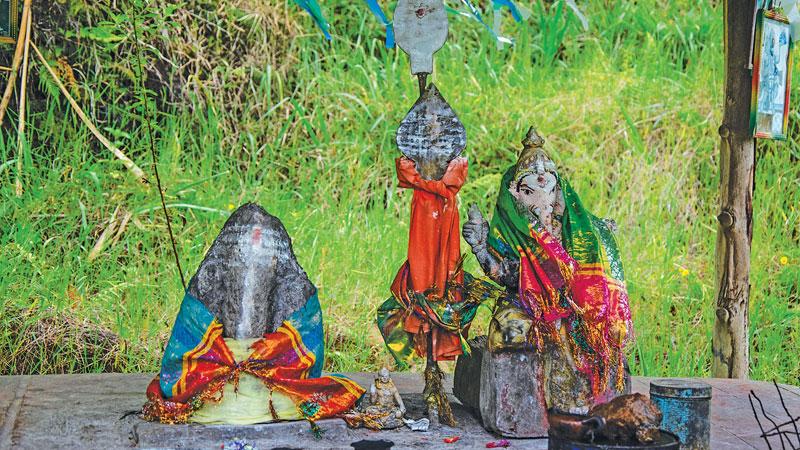
As we cruised along the A7 highway, relishing the mesmerizing vistas of the lush green tea estates in the Maskeliya region, we came across colourful little roadside shrines dedicated to Hindu deities, gleaming in the sun. The sacred places were deserted. We decided to explore, and trudged barefoot across the hot, stone flight of steps towards the shrines where one or two statues of Hindu deities wrapped in colourful sacred cloths stood with tridents, mostly set under trees. They are venerated by estate workers, mostly Hindus. Here we washed out feet, a spiritual observance of cleansing before entering holy ground for a refreshing experience in the humidity of the late morning.

When I photographed one of these roadside shrines in an estate near Maskeliya, an elderly Tamil woman, Parameswari shouted “Swami, swami, this is our Kovil.” Smiling with her, I took several photographs of the deities. She said they make offerings daily to Lord Ganesh (Pillayar), before they set off to pluck tea leaves.
The estate workers have faith on the deities and the deities have compassion for people - this is what the Tamil workers in the estates believe.
 The massive tea estates surrounding the Central highlands always had good climatic conditions for tea. As we climb through the cluster of well-grown tea bushes to the mist-laden peaks, a cool drizzle envelops the green carpet of tea bushes.
The massive tea estates surrounding the Central highlands always had good climatic conditions for tea. As we climb through the cluster of well-grown tea bushes to the mist-laden peaks, a cool drizzle envelops the green carpet of tea bushes.
Standing at the peak we get a glimpse of the tea factories, the cluster of line rooms (houses) of the estate workers and charming images of Lord Ganesh. The best ones are those found at roadside shrines, nestling under a rock or crudely carved stones, often smeared with turmeric paste and garlanded with flowers set on the roots of trees, at the tea plantations.
Lord Ganesh is an ancient god. His cult almost predates classical or Vedic Hinduism and some scholars believe Ganesh was probably a tribal god, a kind of totem. Maybe he was first worshipped by forest-dwellers of the South Indian subcontinent in pre-historic times. The colonial rulers brought estate workers from South India, especially, from Tamil Nadu to work in Sri Lankan estates, (Ceylon) and they brought their traditions and rituals along with them. Thus the small shrines built at the edge of each tea estate are known as Wathu Kovil (estate shrines).
The story goes that the people of Uttara Pradesh, the hottest province in India, suffered epidemic diseases such as, measles, yellow fever and chicken pox, considered as diseases associated with the deities. Those afflicted with the disease made vows to Goddess Pattini at the Kovils.
They bathed and cleaned their bodies in boiled turmeric water mixed with Kohomba (Neem) leaves. The females in their homes would come to estate kovils and invoke the blessings of the deities, especially, by bathing the statue of Goddess Pattini in the turmeric mixed water and cow-milk filled in new pots. Thereby, the patients were cured and the people continued to have faith and devotion towards the deities.Hence, even after the Indian workers settled down in Sri Lankan estates, they maintained their beliefs and traditions.
 To the estate workers, mostly the Hindus, religion forms part and parcel of their daily activities. Observing the traditions that passed down the generations is part of their way of life. At the Mauessakele tea estate, I met a Tamil estate worker, Parama Sivam, 73, who has been living in the estate since his childhood. “Early in the morning, we make offerings of poojas to the Pillayar Swami (deity) with pongal, flower garlands, boiled gram, etc. before commencing work.
To the estate workers, mostly the Hindus, religion forms part and parcel of their daily activities. Observing the traditions that passed down the generations is part of their way of life. At the Mauessakele tea estate, I met a Tamil estate worker, Parama Sivam, 73, who has been living in the estate since his childhood. “Early in the morning, we make offerings of poojas to the Pillayar Swami (deity) with pongal, flower garlands, boiled gram, etc. before commencing work.
The overseers in the estates also join these poojas with the workers. Not everyone can administer these poojas, a priest or Poosari is needed to conduct the offerings. People should venerate and invoke blessings of the deities before starting work,” says Parama adding that religious observance is a must when commencing work at auspicious times. “Today, no one works properly. People of the bygone years, offered poojas and venerated the deities to invoke their blessings before they commenced work,” he emphasized.
Soon after the withdrawal of the British tea planters from their plantations in the 1960s, the locals who took over the management of the tea estates were only concerned about profit making, forgetting the traditions of the estates and its workers. As a result, Kovils were left to decay due to the lack of the veneration of deities. However, some of the Kovils which have been functioning since 1960 still maintain the traditional rituals and Hindu devotees throng these places to voice their grievances or make vows and offerings.
